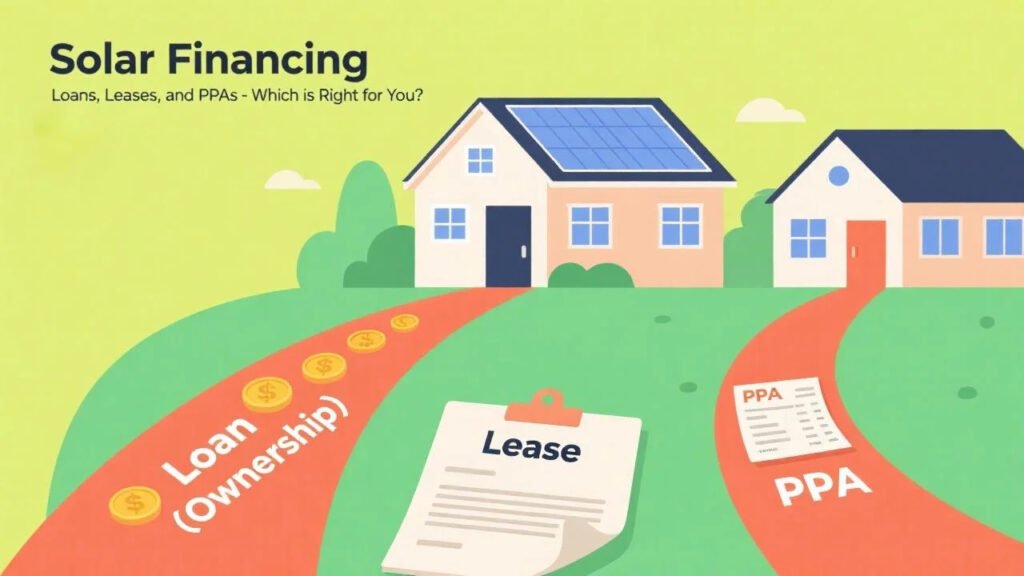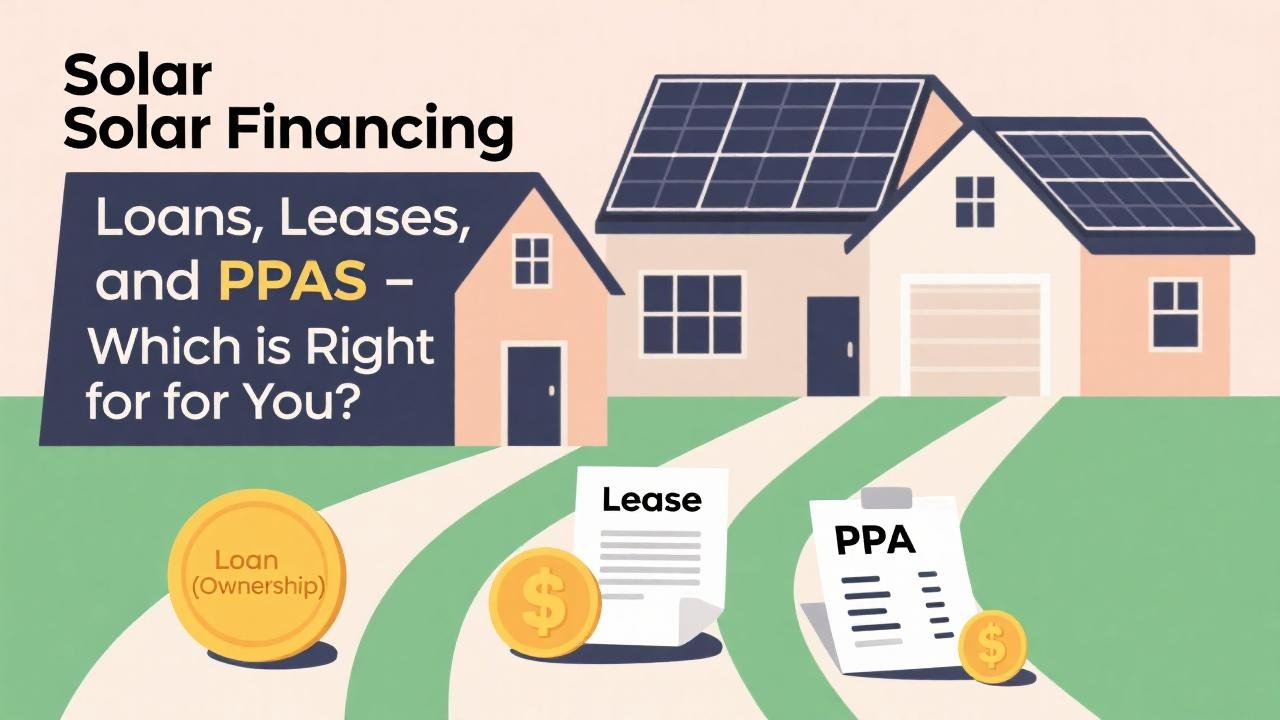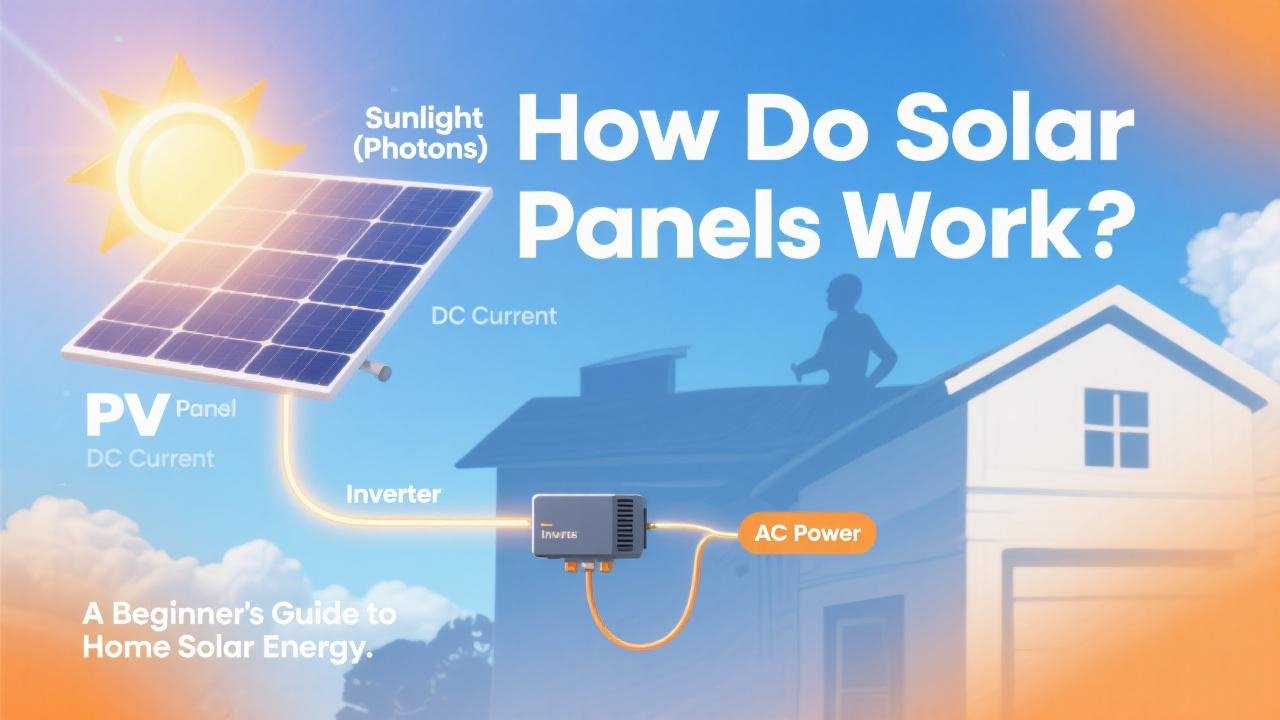Introduction: Powering Your Home Without Breaking the Bank
Investing in a solar panel system is a smart move for your wallet and the planet. However, the upfront cost can seem substantial. The good news is that a variety of solar financing options are available, making solar accessible to more homeowners than ever before. The three main avenues are solar loans, solar leases, and Power Purchase Agreements (PPAs). Understanding the differences, pros, and cons of each is crucial to choosing the path that best aligns with your financial goals and homeownership situation.
This guide will break down these solar financing options, helping you determine which route might be the best fit for you. Platforms like EnergySage can also connect you with installers who offer various financing solutions, allowing you to compare them alongside your equipment quotes.
Option 1: Purchasing with Cash or a Solar Loan (System Ownership)
Paying for your solar system outright with cash or financing it with a solar loan means you own the system. This is a key distinction with significant financial implications.
A. Paying with Cash:
- How it Works: You pay the full cost of the solar panel system upfront.
- Pros:
- Highest Long-Term Savings: No interest payments mean the lowest overall system cost and the quickest path to maximizing your return on investment (ROI).
- Full Incentive Eligibility: You are eligible for all federal, state, and local tax credits and rebates, including the 30% Federal Solar Investment Tax Credit (ITC).
- Increased Property Value: Owned solar systems typically add significant value to your home without the encumbrance of a loan or lease.
- No Monthly Payments: Once paid for, you enjoy free electricity from the sun (after accounting for any remaining utility charges).
- Cons:
- High Upfront Cost: Requires a significant amount of available capital.
- Ties Up Capital: That money could potentially be invested elsewhere.
B. Solar Loans:
- How it Works: You borrow money from a lender (bank, credit union, specialized solar lender, or sometimes through your installer) to cover the cost of the system. You then repay the loan over a set term with interest.
- Pros:
- System Ownership: You own the solar panels and all associated benefits.
- Full Incentive Eligibility: Like a cash purchase, you can claim the federal ITC and other applicable incentives, which can significantly reduce the net cost of the system.
- Potential for Immediate Savings: Your loan payment plus any remaining utility bill could still be less than your previous electricity bill.
- Fixed Monthly Payments: Makes budgeting predictable.
- Builds Equity: Increases your home’s value.
- Cons:
- Interest Costs: You’ll pay interest over the life of the loan, increasing the total system cost compared to a cash purchase.
- Credit Requirement: Requires good credit to qualify for favorable interest rates.
- Lien on Property (for secured loans): Some solar loans are secured by your home, meaning the lender could foreclose if you default. Unsecured loans are available but often have higher interest rates.
- Loan Fees: Some loans may have origination fees or other closing costs.
Types of Solar Loans to Consider :
- Secured Loans: Use your home as collateral, often offering lower rates.
- Unsecured Loans: Don’t require collateral, generally have higher rates.
- FHA Title I Loans: Government-backed loans that can be used for solar.
- Installer-Offered Financing: Convenient, but always compare rates and terms with independent lenders. Marketplaces like EnergySage allow you to see financing options offered by various installers.
Option 2: Solar Leases (Renting the System)
With a solar lease, you don’t own the solar panel system; a third-party company (the solar lessor) owns and maintains it on your roof.
- How it Works: You pay a fixed monthly “rent” to the solar company for the use of the solar panel system and the electricity it produces. Lease terms are typically long, often 20-25 years.
- Pros:
- Little to No Upfront Cost: Often marketed as “$0 down solar,” making it accessible if you don’t have cash for a purchase or can’t get a loan.
- Predictable Monthly Payments: Your lease payment is usually fixed, though some leases include an “escalator clause” that increases the payment annually (designed to stay below utility rate inflation).
- Maintenance Included: The solar leasing company is typically responsible for all system maintenance, repairs, and monitoring.
- Potential Bill Savings: Your lease payment plus any minimal utility charges might be less than your previous average electricity bill.
- Cons:
- No Ownership: You do not own the system.
- Ineligible for Tax Credits/Incentives: The solar leasing company, as the system owner, claims the federal ITC and other ownership-based incentives.
- Lower Overall Savings: Long-term savings are generally much lower compared to owning the system.
- Escalator Clauses: If your lease has an escalator, your payments will increase over time, potentially eroding savings if utility rates don’t rise as quickly.
- Selling Your Home Can Be Complicated: Transferring a solar lease to a new homebuyer can sometimes be challenging, potentially delaying or complicating a home sale.
- No Direct Increase in Property Value: Since you don’t own the system, it typically doesn’t add to your home’s appraised value.
Option 3: Power Purchase Agreements (PPAs) (Paying for the Power)
A Solar PPA is very similar to a lease, but with a key difference in how you pay.
- How it Works: Like a lease, a third party owns and maintains the solar system on your roof. However, instead of paying a fixed monthly rent for the equipment, you agree to purchase the electricity generated by the system at a set price per kilowatt-hour (kWh). This per-kWh rate is typically lower than your utility’s retail rate.
- Pros:
- Little to No Upfront Cost: Similar to leases, PPAs often require no initial investment.
- Pay Only for What’s Produced: Your payments are based on the actual electricity generated by the system.
- Maintenance Included: The PPA provider is responsible for system upkeep and performance.
- Potential for Bill Savings: If the PPA rate is significantly lower than your utility rate, you can save money.
- Cons:
- No Ownership & No Incentives: Same as with a lease, you don’t own the system and can’t claim tax credits.
- Variable Monthly Payments: Your payment will fluctuate based on how much solar energy is produced (e.g., higher in sunny summer months, lower in winter). This can make budgeting less predictable than a fixed lease payment.
- Escalator Clauses: PPAs often include an annual rate escalator, meaning the price you pay per kWh will increase over the contract term (typically 20-25 years).
- Selling Your Home Challenges: Similar to leases, transferring a PPA can be complex.
- Lower Overall Savings: Generally less financially beneficial in the long run compared to system ownership.

Making the Right Choice for Your Home
The best solar financing option depends entirely on your individual financial situation, goals, and priorities.
- Choose Cash or a Solar Loan if:
- You want to maximize your long-term savings and ROI.
- You want to take full advantage of tax credits and incentives.
- You want to increase your home’s value.
- You have good credit (for a loan) or available cash.
- Consider a Solar Lease or PPA if:
- Your primary goal is to reduce your electricity bill with little or no upfront cost.
- You don’t qualify for a loan or prefer not to take on debt.
- You are not eligible for or interested in claiming tax credits.
- You prefer not to be responsible for system maintenance.
Key Questions to Ask Before Signing Any Agreement:
- What is the total cost over the life of the agreement (including interest or escalators)?
- Who is responsible for maintenance and repairs?
- What happens if I sell my home?
- Are there any early termination fees?
- What is the warranty coverage for equipment and workmanship?
How EnergySage Can Help You Navigate Financing
Understanding these options is the first step. The next is getting actual quotes and comparing offers. EnergySage provides a platform where you can receive multiple quotes from pre-screened installers, many of whom offer various financing options. This allows you to:
- Compare loan, lease, and PPA offers side-by-side.
- See how different financing structures impact your upfront costs and long-term savings.
- Connect with unbiased Energy Advisors who can explain the nuances of each option and help you analyze which is best for your financial situation.
Investing Wisely in Your Energy Future
Financing your solar panel system is a significant decision. Whether you choose to purchase with cash, take out a solar loan, or opt for a lease or PPA, thoroughly research your options and understand all terms and conditions. By doing so, you can confidently select the financing path that best empowers your transition to clean, renewable solar energy. Using a trusted resource like EnergySage can simplify this complex decision by providing transparency and access to competitive offers from qualified professionals.



